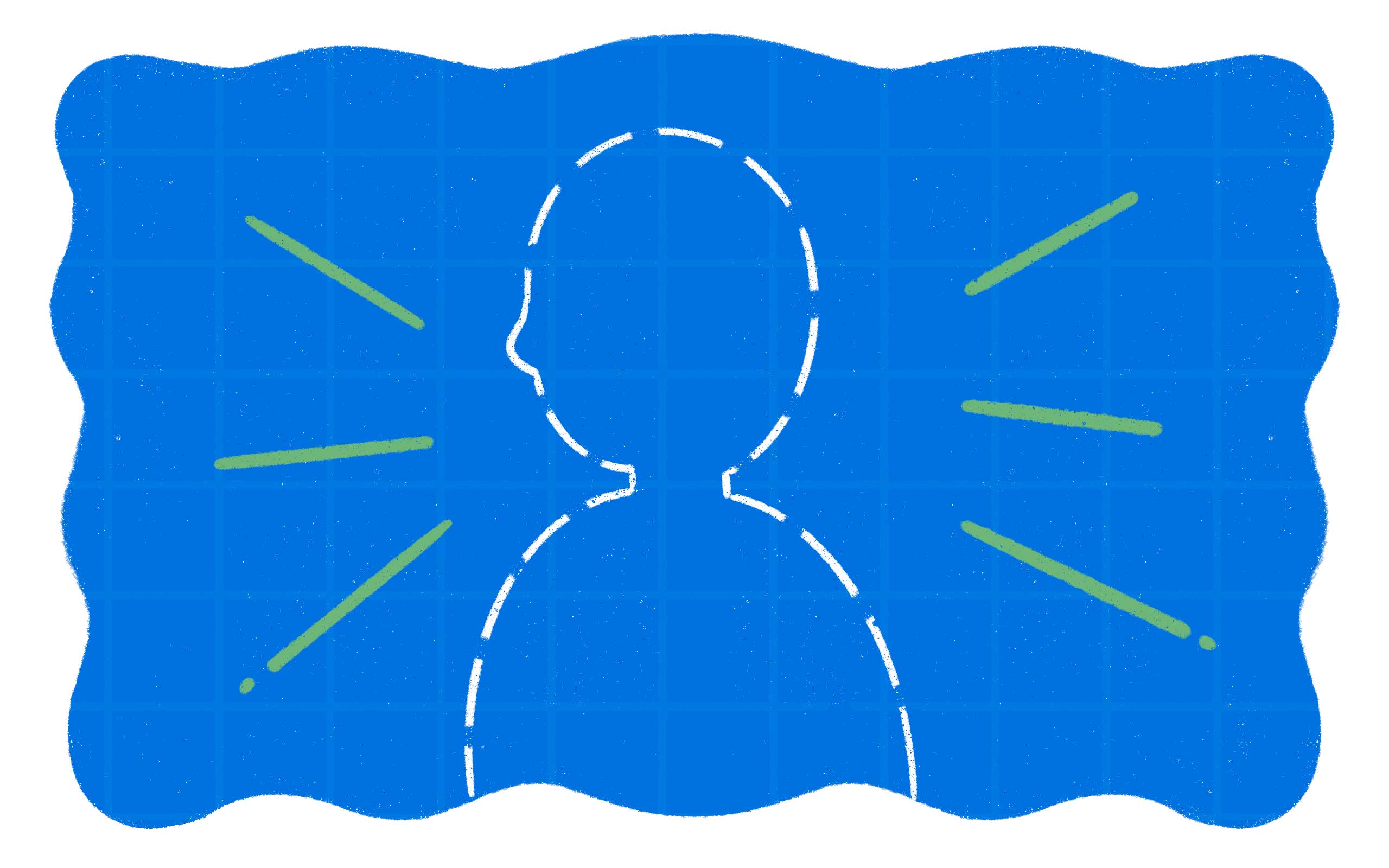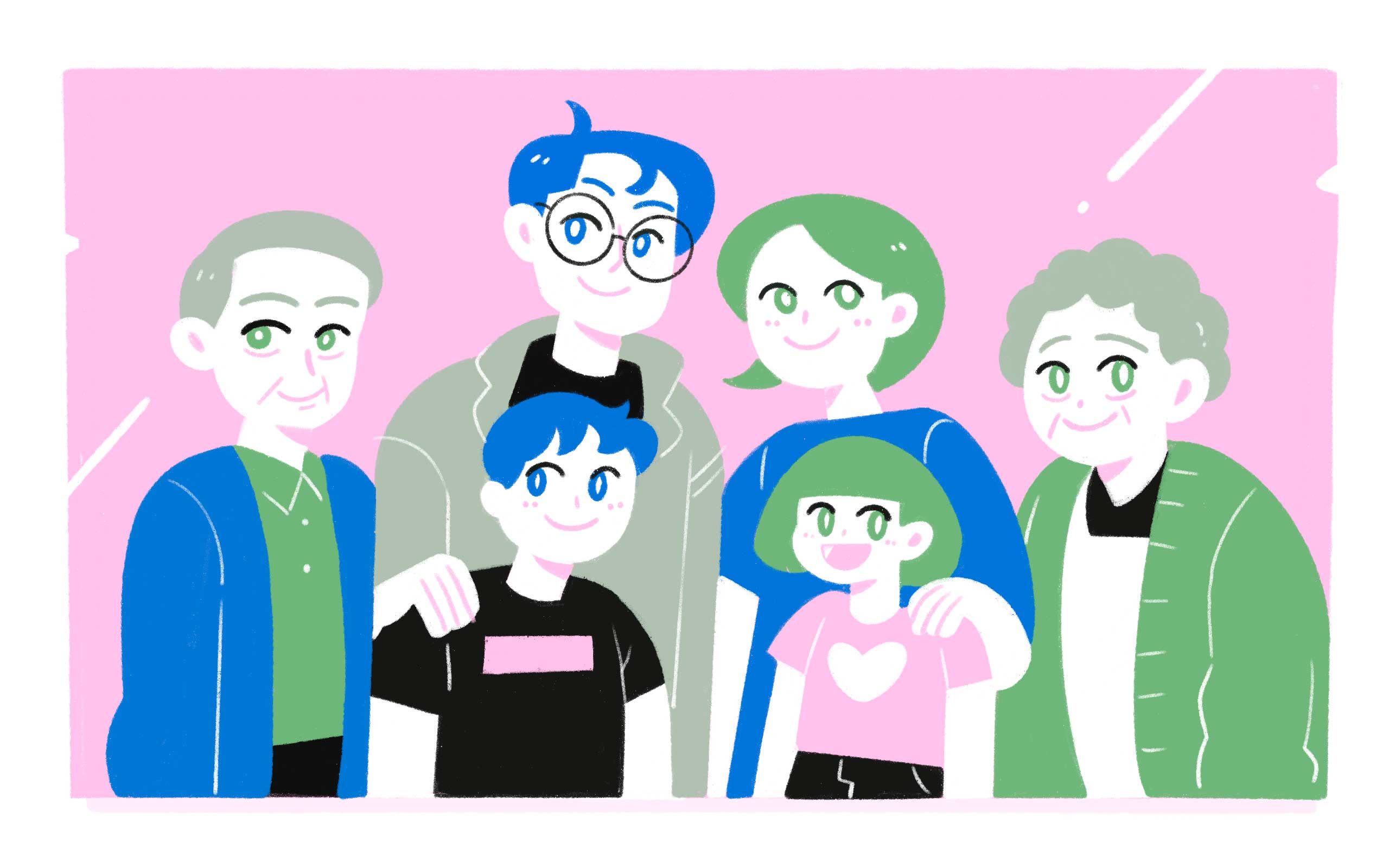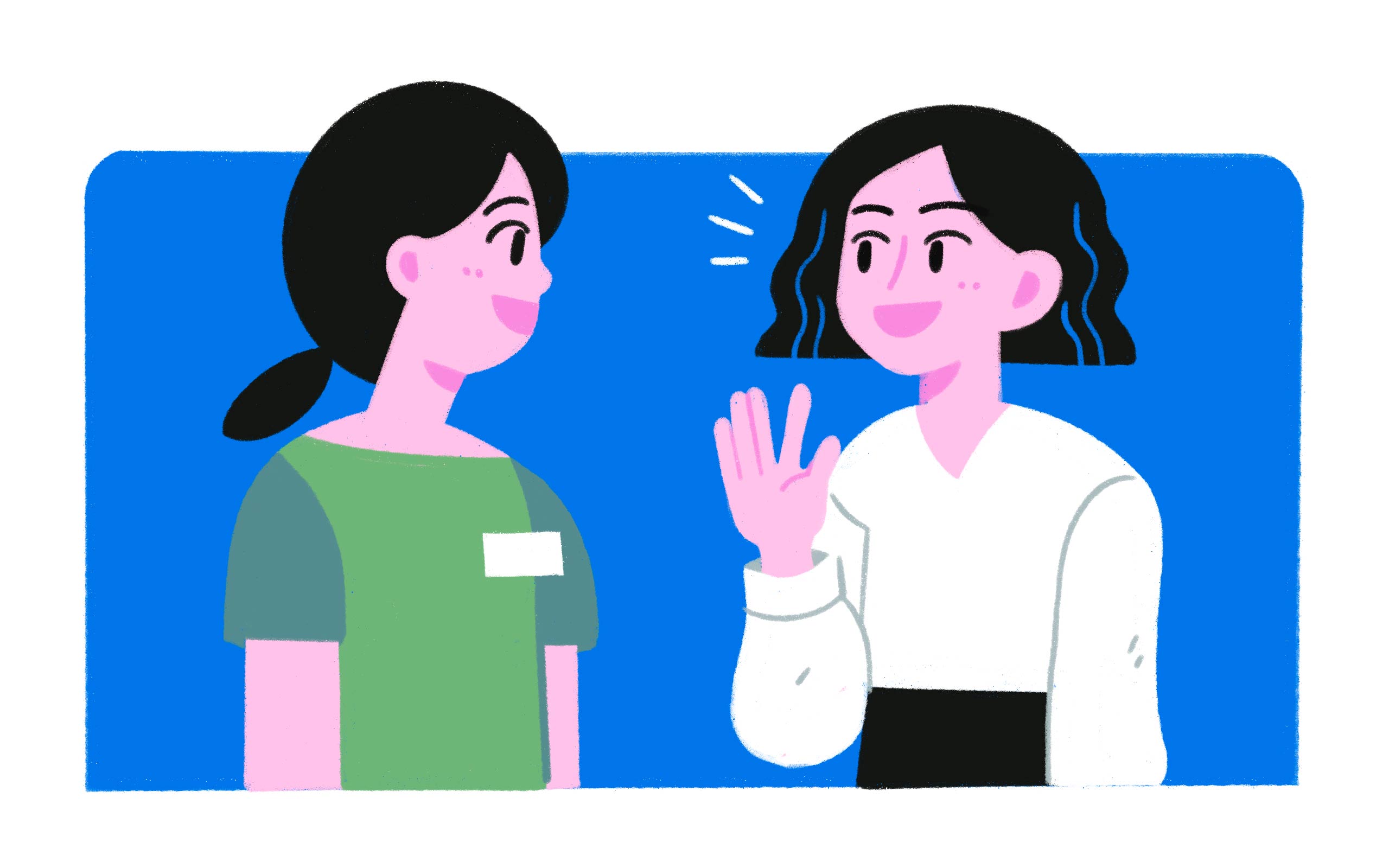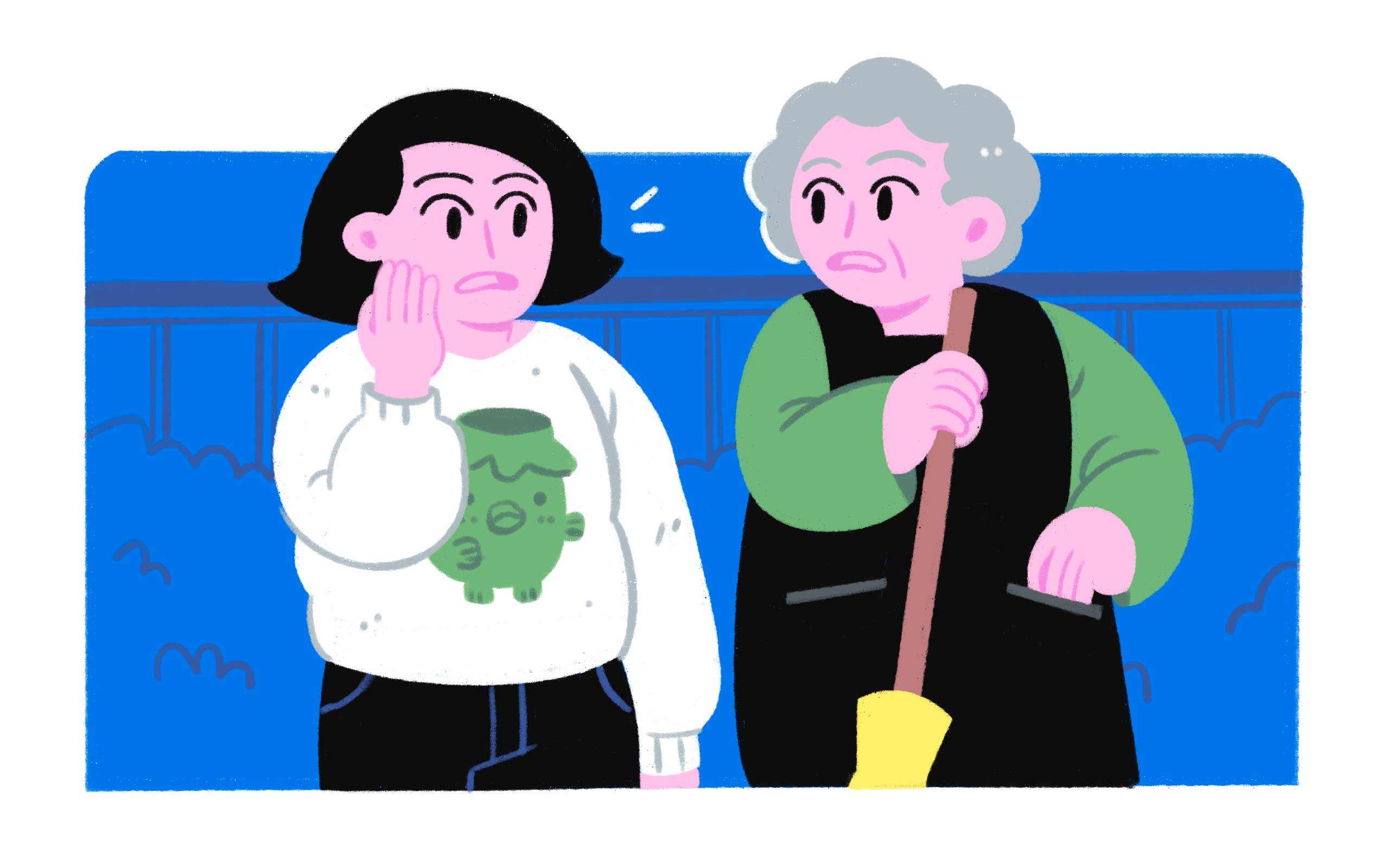…Hey, did you hear that they broke up? Apparently, she broke up with him!
Even in a casual, gossipy conversation like this, you can easily spot these words: you, they, she, and he. These are words that are used to address and refer to others. They are essential elements of the English language, and it's hard to imagine a conversation without them.
However, I'm writing this article because this is not the case in Japanese. It's far less common to use these words, a.k.a second-person pronouns and third-person pronouns, in real-life conversations.
So, how can we get by without using these pronouns? Here are a few options.
- Don't use anything. Omit pronouns and references to people from your sentence.
- Use names, family roles, or social roles instead.
- Use one of our sneaky back-up options™.
This last option is for when the first two don't work out. It's always good to have a few back-up options in your pocket, right? For example, what about that friendly neighbor of yours, whose name always eludes you? How would you address them? We'll show you how to deal with this type of sticky situation, as well as others, just like a pro.
Despite being a native Japanese speaker, I admit that I have a hard time deciding how to address or refer to someone, from time to time. It can be a complicated, and at times, awkward thing to do. This is the case even if you're fluent in Japanese. So keep reading this article, and hopefully, it will help you feel more confident and prepared for your Japanese interactions!
- Option 1: First, Consider Omission
- Option 2: Use Names, Family Roles, or Social Roles
- Option 3: Our Sneaky Back-up Options™
- Feeling Prepared To Meet New People?
Prerequisites: This article assumes you already know hiragana and katakana. If you need to brush up, have a look at our Ultimate Hiragana Guide and Ultimate Katakana Guide. If you're not familiar with the personal pronouns, reading our second-person pronouns and third-person pronouns pages should give you a great head start. Also, bonus points if you already know about name enders. Go ahead and read it now, then come back when you're ready!
Before we really get into it, I wanted to let you know that we have a podcast series about the same topic (how you can refer to and address others in Japanese). I highly recommend you check both the article and the podcast as the episodes are complementary to this article.
If you'd like, you can subscribe to the Tofugu Podcast so that you can save episodes for later and discover more Japanese related content when you're not busy reading our articles! 😉 Now let's get to the good stuff.
Option 1: First, Consider Omission

This first option might sound crazy considering how English sentences are structured. In Japanese, you can omit subjects and/or objects in sentences, and still have a natural conversation. In fact, according to a variety of linguists, when a Japanese personal pronoun is used as the subject, it gets omitted 40% of the time in written communication, and 70% in spoken communication. 1
…Not quite convinced yet? Let's take a look at an example to see how it happens.
- …ねえ、君は、彼らが別れたって聞いた?
- …Hey, did you hear that they broke up?
This example has a second-person pronoun ( 君) and a third-person pronoun ( 彼ら) in it. Since these words are not commonly used in conversations, this would sound pretty unnatural. Especially since addressing someone using a second-person pronoun may come off as rude, you don't want to risk it here.
Now, let's experiment by omitting 君 and 彼ら, the equivalents of "you" and "they."
- …ねえ、別れたって聞いた?
- …Hey, did you hear that they broke up?
Now, although the pronouns are gone, this sentence still works just fine. It's actually even more natural than the previous example, as long as there's some context. And if your friend whispered this in your ear? You'd know your friend is talking to you. Duh. In English too, when you're texting or talking to your friend, you might omit the pronoun at times. Like saying, "Wanna hang out later?" In Japanese, this happens more, and not only in casual settings.
So what about the way 彼ら (they) is left out? The speaker and listener have to have shared context or a mutual understanding for it to work. Perhaps, this was said right after you and your friend ran into the "she" and the "he" in the hallway. Then, voila! You would instantly know who your friend is talking about.
In Japanese, including an explicit reference to the people you're discussing is optional.
Without any sort of context though, if this question popped up out of the blue, there would likely be some confusion. You might end up asking, "Who are you talking about?" 🤷🏻♀️ And of course that happens too! Though, the point is, in Japanese, including an explicit reference to the people you're discussing is optional. Unless there is a need to specify what you're talking about, like when the context is unclear or you want to bring up a new topic, that piece of information is likely to be left out.
Option 2: Use Names, Family Roles, or Social Roles
You witnessed how convenient Japanese can be when it comes to not having to spell out every piece of information. However, there are situations where omission simply doesn't work out. For example, even if your friend believes the context is obvious for both of you, what if you totally spaced out and didn't pay attention? You might be like, "Wait…what are you talking about?" In that case, your friend would try to clarify what they mean exactly (though they might roll their eyes at the same time!).
There are also times when omission isn't even an option. For example, sometimes who did what is an important part of the story, so you can't omit reference to specific people. Now, let's take a look at another way to phrase the gossip example.
- 彼女が彼をフッたらしいよ!
- Apparently, she broke up with him!
This wouldn't have made sense if we omitted the subject and the object, which tells you who broke up with whom. So omitting doesn't quite work here. However, using third-person pronouns, 彼女 (she) and 彼 (he), sounds a bit awkward in a real-life conversation.
So what can we do instead? Here are some things you can use:
- Use Names (e.g., Rachel, Tanaka-san, Kenichi)
- Use Family Roles (e.g., mom, grandpa, auntie)
- Use Social Roles (e.g., doctor, mayor, driver)
And, you can use these options just like you use personal pronouns in sentences. Basically, instead of using a second-person or third-person pronoun, you can use the person's name, their family role like mom and dad, or their social role like sensei. For example, in the previous sentence, you can replace 彼女 (she) and 彼 (he) with their actual names, such as キョーコ and ケンイチ.

- キョーコがケンイチをフッたらしいよ!
- Apparently, Kyoko broke up with Kenichi!
This works beautifully in Japanese. However, you might be wondering what happens when we mention Kyoko or Kenichi later on. How do we refer to them then? In English, you often use pronouns rather than repeated mentions of names, in order to avoid redundancy. Let's demonstrate with an example to see how Japanese works in this kind of situation.
- キョーコがケンイチをフッたらしいよ!で、キョーコには、もう新しい彼氏ができたみたい。
- Apparently, Kyoko broke up with Kenichi! And it seems that she has a new boyfriend already.
…What juicy gossip! 🤭 Anyway, just like this, it's totally okay to repeatedly use a person's name (in this case, Kyoko), family role, or social role, and not avoid the redundancy, especially in Japanese conversations. If it bothers you, you could simply omit as well, just like we discussed previously.
- キョーコがケンイチをフッたらしいよ!で、もう新しい彼氏ができたみたい。
- Apparently, Kyoko broke up with Kenichi! And it seems that she has a new boyfriend already.
Another fact to be aware of is that it's also common to use names, family roles, or social roles in a second-person perspective. That means, instead of addressing someone by calling them "you," you can use these other terms. This isn't something that's typically done in English. Here's an example.
- キョーコがケンイチをフッたの?
- 1. Did Kyoko ditch Kenichi?
2. Did you ditch Kenichi, Kyoko?
3. Did Kyoko ditch you, Kenichi?
As you can see, there are three possible translations, and it can be interpreted in all three ways. That means this question can be directed to anyone. You can ask this same exact question to:
- Someone who's neither Kyoko nor Kenichi
- Kyoko
- Kenichi
Interesting, right? Generally, this method of using names, family roles, or social roles is the clearest, surest way to refer to and address someone in Japanese conversations. That is, as long as you know what to call them.
Use Names

Calling someone by their name indicates that you remember their name, and it creates a personal and somewhat friendly feel. It sounds easy enough, but do you know what this entails when it comes to Japanese names?
In Japanese, a "first name" doesn't come first. The family name comes first, followed by the first name (or "given name" to avoid confusion). The family name is called 名字, and given name is 下の 名前, literally meaning "bottom name." We call the given name "bottom name" because in vertical writing, which is the traditional way of writing in Japanese, it's the bottom half! However, for foreign names, which name comes first depends. It might be written in the given name → family name order, to follow the English or other language's rule.
Another big difference is that most Japanese people have no middle name. While it's possible that Japanese nationals born abroad or those born to bicultural parents might be given one, their middle names are not recognized as such in official government documentation.
Now let's do a mini exercise to review what we've just talked about. Let's say you get a business card from a woman who you've just met. What is her given name and what is her family name in this example?
田中 京子
The answer is, 田中 (Tanaka) is her family name, and 京子 (Kyoko) is her given name.
"Cool. I'll call her Kyoko then!" Whoa, easy tiger! Here's another thing you should know. Calling someone by their first name feels a little more intimate in Japan than in English-speaking countries in general. It's quite normal in English to use first names, even for people who you've just met or in business settings. However, in Japanese, this tends to only happens in casual situations.
Calling someone by their first name feels a little more intimate in Japan than in English-speaking countries in general.
We also have name enders such as 〜さん. This is sort of like the Japanese version of "Mr." and "Ms." but with more variations. It depends on the relationship or situation, but calling someone by their name without using a name ender can come off blunt or rude. This is especially true when you don't know a person well. So consider using one of the name enders such as 〜さん, 〜ちゃん, 〜くん. Or, consider coming up with a nickname for them, if you're close enough. By attaching these name enders, you can express not only respect, but feelings of endearment as well. For more information about name enders, read our articles about it.
Use Family Roles

For addressing or referring to your family members, it's very common to use family roles. However, what you call each family member depends on your family and your personal preferences. Also, these roles can change over time. For example, I grew up calling my mom お母さん. Some of my friends called their moms ママ when they were little, then eventually switched to お母さん.
Here's a chart of commonly-used family roles. The ones in parentheses are common, especially among little children.
| Casual | Formal | ||
| お祖父ちゃん (じいじ) |
grandpa | 祖父 | grandfather |
| お祖母ちゃん (ばあば) |
grandma | 祖母 | grandmother |
| お父さん (パパ) |
dad | 父 | father |
| お母さん (ママ) |
mom | 母 | mother |
| 叔父さん (おじちゃん) |
uncle | 叔父 | uncle |
| 叔母さん (おばちゃん) |
auntie | 叔母 | aunt |
| お兄ちゃん | big bro | 兄 | older brother |
| お姉ちゃん | big sis | 姉 | older sister |
Notice there are "Casual" and "Formal" columns on this chart. The casual terms are for situations where you're talking to your family member directly. Or, when you're talking about them in casual conversations with friends or other family members. On the other hand, the formal terms are reserved for when you refer to your family members in formal or official settings. For instance, if you were talking about them at a job interview. It's considered a form of social etiquette to use these words to talk about your own family members in formal settings.
Let's say today is take-your-parents-to-work day (not sure if such a thing exists for you, but we'll use it for the sake of example!). You take your mom to your office, and you want to introduce her to the CEO of your company. You'd use the formal version, 母 and say:
- うちの母です。
- This is my mother.
However, even right in front of the CEO, you'd still call your mom お母さん when talking to her. Most people don't use formal terms when speaking directly to their relatives.
- お母さん、こちらが社長だよ。
- Mom, this is the CEO.

The family role you're assigned to depends, as it changes based on the relationship you have with other family members. For instance, your mom is your dad's wife, as well as your grandparents' daughter. In terms of what to call another family member, you'll want to consider your relation to your relative as well as who is higher on the family tree. Family roles are usually used by the relative who is lower on the family tree to refer to those who are higher. Conversely, the relative who is higher on the family tree would likely opt out of using the family role to refer to someone lower. So instead, your parents, older siblings, or grandparents, would call you by your name or nickname. If you're a younger brother, your older sibling might refer to you as 弟 (younger brother) when talking about you to someone ouside the family (especially when they don't know your name). However, they would call you by your name, not 弟 (younger brother) when they talk to you or other members of your family. The same goes for your parents or grandparents. They wouldn't call you 息子 (son) or 孫 (grandchild).
Family tree rankings usually correspond to age. However, if, for example, your aunt/uncle or stepparent happens to be younger than you, you might call them by their name/nickname rather than their family role. It would be case-by-case, of course.
Some family roles can also be used as name enders. This is especially true for relatives that have many roles. Just like we say "Uncle Kenichi" in English, in Japanese it's the same idea! Uncle Kenichi would be ケンイチおじさん. This rule also applies to your siblings. Particularly, if you're in a big family with a bunch of siblings. You would call your big sister named Kyoko, キョーコお姉ちゃん.
Although I said the rule of thumb is that younger relatives refer to older relatives using family roles, there is an exception. When older family members are speaking to younger relatives, they may base their choice of words off of the younger relatives' perspective. For example, when you're talking with your grandchildren, you would call their dad お父さん (Dad). It's not weird because for your grandchildren (whom you're talking to), he is their dad.
- お父さんもう帰ってきた?
- Is your dad back yet?
Similarly and interestingly, it's also common for Japanese couples, especially those who have children, to call each other お母さん (Mom) and お父さん (Dad). Couples probably call each other something different before having kids (god, I hope so). They likey use the other's name or nickname, but eventually make the switch. This custom often stays even after the kids move out of the house. In English, this might sound sort of strange! 😳
For those who have Japanese in-laws, it's also important to know that it's traditional to use お義母さん and お義父さん for your parents-in-law. There's an extra 義 kanji added to the word to show they're "in-laws" in written Japanese, but in spoken Japanese, it's actually the same pronunciations as お母さん and お父さん.
Use Social Roles

You can also use social roles, meaning job titles and such. An iconic example is sensei, which is what students use to address and refer to teachers. It also can be used for doctors, lawyers, politicians, and so on. (For more details about sensei, check out our article: The Meaning of Sensei: More than Just "Teacher".)
Using social roles is often an honorific and respectful way to refer to someone, while also acknowledging one's own position. Especially in a hierarchical relationship, it's common for someone in a lower position to use social roles to address someone in a higher position. In this way, it's similar to the family roles we just talked about. There are tons of social roles out there, but let me introduce a few to give you a taste.
| Social Role | |
| 先生 | teacher, doctor, lawyer, etc |
| 校長先生 | principal of school |
| 社長 | CEO |
| 店長 | store/restaurant manager |
| 先輩 | senpai, mentor |
Again, you've only just scratched the surface! Social roles can include political figures, such as 総理大臣, "prime minister," often shortened as 総理. You call a mayor 市長 or 町長 depending on whether they are the governer of 市 (city) or 町 (town). If you are working at a train station, then the station manager is 駅長, and the train conductor would be 車掌.
Using social roles is often an honorific and respectful way to refer to someone, while also acknowledging one's own position.
Just like every family has its own way of referring to each other, companies and organizations are the same. They have different rules and customs on how people should address each other. Some companies have an old-school tradition of calling superiors by their job title, such as 部長 (department manager), or use it as a name ender, as in 田中部長. Some companies might encourage their employees to refer to each other as family name + さん to make it feel less stiff. Some cool, hip startups might make it all casual and go with given names and nicknames! So it really depends on the culture of the company, and it ultimately comes down to the personal preference of what someone wants to be called. When you join a new company and are not sure, consider asking, or pay attention to how people address others!
In a place like a company or organization you belong to, it's easy to imagine a situation in which you'd call someone by their social role. However, social roles can be based on an occasional, temporary relationship as well. You still meet people outside of these social circles on a daily basis.
For example, when riding in a taxi, you might have some small talk with the driver. What would you call the driver? Let's say they ask you a question, and you want to ask the same question back, "What about you?" You wouldn't want to use あなた here because you don't want to risk it, as it could come off as rude. In this case, you can use 運転手 (driver) and stick a name ender 〜さん on the end!
- 運転手さんはどうですか?
- What about you?
Then the driver might call you お客さん (customer). How about if you make friends with a middle-aged gentleman at the local vegetable stand you frequent (and you don't know his name)? You may refer to him as 八百屋のおじさん (uncle at the veggie stand), or can even simply call him おじさん (Uncle).
Social roles can be based on an occasional, temporary relationship as well. You still meet people outside of these social circles on a daily basis.
Did you notice how おじさん was used here? Even if you're not actually related to someone, family roles can be a way to refer to a certain demographic based on their age and gender. And this is not limited to aunt/uncle, which are also used in English-speaking countries in a somewhat similar way. Though, be aware this comes with the risk of potentially offending the person by misgendering them or mis"age"-ing them.
Calling someone by a family name like this is especially common when you want to address a stranger or a person whose name you don't know. If you see a young man dropping a phone on the street, to get his attention, you might use a word お兄さん (brother), for example.
- そこのお兄さん!
- Hey there, sir!
I translated it as "sir," but be aware that お兄さん is usually for young men. It depends on how old you are as well, but if you call an eldery gentleman お兄さん, he might not even realize that you're trying to grab his attention! (Though, when he does realize, he might feel pleased.)
Another place where you often interact with people you don't know is online. Unlike in real life, where you can guess a stranger's age and gender from visual cues, you often don't have a lot of information about people's identities online. So how do you address people in these situations? In written form, it's more common and acceptable to use pronouns like あなた, 彼 or 彼女, but there are some unique terms as well. For example, in Yahoo! Answers types of Q&A forums, you'll often see advice to the original poster. How are people referring to them in their answers? Some use あなた, but some people prefer スレ主, or トピ主, meaning "thread/topic owner".
Option 3: Our Sneaky Back-up Options™
As you probably have noticed at this point, there are tons of options for what to call another person in Japanese! Though, there are still several situations that the first two options fail to solve, like when you can't remember someone's name. Don't worry if this ever happens to you, we've got your back. Here are some sneaky back-up options we put together for you, for these sticky moments!
すみません / ちょっと "Excuse Me!"

すみません is a phrase meaning "Excuse me." Just like you say "excuse me!" at stores to ask an employee for help, this works for catching someone else's attention. It's an effective and useful way of having the person acknowledge that you're talking to them. Once the tone is set, it will be easier to not call them anything by simply omitting the unnecessary. Earlier, we talked about how words like おじさん (uncle) or お兄さん (brother) can be used for strangers, but this could potentially offend or sound too friendly with someone. Using すみません is less specific when multiple people are around you, but it comes in handy if you want to play it safe.
Another Japanese phrase, ちょっと has a similar effect. Just be aware this one is a lot more casual!
そっち / そちら & あっち / あちら
Using words for a direction, like そっち, そちら, あっち, and あちら could be an indirect and abstract way of referring to and addressing others. These words are primarily used for pointing to a physical location. そっち and そちら are for a location that's closer to your listener. あっち and あちら are for a location far away from both you and the listener. These words are also used for referring to a person or mutliple people in the vicinity, and therefore is often used for introducing people.
- あちらが、鈴木さんです。
- That person over there is Mr. Suzuki.
This can also be used in a similar way to calling others "you" or "they."
| Formal | Casual | Translation |
| こちら | こっち | My side (I/we) |
| そちら | そっち | Your side (you) |
| あちら | あっち | Their side (he/she/they) |
| どちら様 | N/A | who |
Especially in remote communications such as emails, texts, or phonecalls where you're physically away from the recipient, this is a useful way of refering to others. Having family and friends in another country, I use this quite a bit!
The words, こっち and こちら, typically mean "here" or "this way." The nuance of these words in this context is more like "one's side", as opposed to "my side." They vaguely mean things on someone's side, rather than pinpointing the person themself, as in "you" or "they." For example, when you're calling to check in with your friend, it's a great way to ask about things on their side opposed to your side:
- こっちは元気だけど、そっちは?
- I'm doing great. What about you?
We're doing great. What about all of you?
そっち could be just for "you," but could also mean people on your side, like your family, or people around you, depending on the context. If you started talking about someone you and another person know in common, you might say:
- あっちはどうなんだろうね。
- I wonder how they are doing.
Just like that, it can work as an indirect way of referring to others, even in in-person interactions. The formal variation, そちら (your side) can work conveniently in business settings. Asking a favor, especially to a client, could be awkward, but そちら can be a polite cushion to say something like:
- そちらでご対応いただけないでしょうか?
- Would you mind taking care of that on your end, please?
This "location" reference system works beautifully for those awkward moments where someone visits you or calls you on the phone, and you don't recognize them. To ask "who" politely, どちら様 is a great option. どちら is a part of the そちら/あちら family, and it's even got a fancy honorrific name ender 〜様.
- どちら様ですか?
- May I ask who's speaking?
A bonus pro tip for business Japanese 💡: you can attach formal prefixes 御/貴 to 社 (company) to mean "your company." 御社 is used for verbal communication and 貴社 is more suitable for written communication, such as cover letters for job applications, etc.
お宅

お宅 is the origin of the term "otaku" 🤓. It's said that typical otaku back in the 80s used to call each other this. The literal meaning is "your household" as well as "home" in a physical sense. Similar to そちら and そっち, it's an indirect way of referring to a person, their family, or even to a company or group the person belongs to.
- お宅は、お子さんまだ小さいでしょ?
- Your kids are still little, right?
It's actually not rude to use お宅 to refer to a physical house and is even polite. As a term to address someone though, it comes across as a little old-timey, and somewhat casual of an expression. I personally associate this term with neighborly chitchat. However, it's still going strong in Kansai area 2, and it's sometimes even used in business scenes, often with a name ender,〜様 as in お宅様.
皆 (みんな)
皆 simply is a casual term that means "everyone." You can use it for a group of people or a general audience, such as the dear listeners of your podcast or YouTube channel!
- みんな、元気?
- How are you all doing?
What should we use in formal situations? You can stick to the name ender 〜さん for this one as well and make 皆さん. Notice that the ん in the middle is gone now! It's みなさん, not みんなさん.
Can't Remember Someone's Name?
"What's your name again?" In Japanese, it feels more awkward if I straight up ask that.
Earlier, we talked about using the name of the person who you want to address. It's probably the most preferable and common option. That is, unless their family role or social role is more appropriate. However, what if you forget their name? That actually happens to me a lot! In English, I personally feel more comfortable asking, "What's your name again?" In Japanese though, it feels more awkward if I straight up ask that.
One thing you can do is to ask what the person's あだ名 or ニックネーム (nickname) is, or what their friends usually call them.
- あだ名とか、ある?
- Do you have a nickname?
- 友達に何て呼ばれてる?
- What do your friends call you?
Another indirect way you can do this is to ask how the person writes their name. It's like asking, "How do you spell your name?" in English. Maybe you can tell the person that as a Japanese learner you are curious about learning kanji, so you can camouflage your intention. 😉
- 名前、どうやって書くの?
- How do you write your name?
You can also ask this in the polite form — お名前、どうやって書くんですか? When asked this way, it can also be used in formal situations.
Ask "What Should I Call You?"
If it's someone whom you're potentially building a relationship with, it might be worth considering asking them their preference.
If you couldn't find the perfect option for your specific situation so far, here's the final weapon for you. That is, asking, "What should I call you?" — plain and simple! I would say, don't bother for a very short, temporary relationship. Such as in the case with the taxi driver (unless they sound super cool, and you want to be friends with them!). If it's someone whom you're potentially building a relationship with, it might be worth considering asking them their preference. Or else, confirm what you were going to use sounds alright to them.
Here's a convenient list of phrases you can use to inquire about what you should call someone. For the level of the formality, three stars indicates that they're very formal, two stars are semi-formal, one star is casual.
| Formality | Japanese | Translation |
| ★★★ | どうやってお呼びしたらいいでしょうか? | What would you like me to call you? |
| ★★★ | 〜とお呼びしても、いいでしょうか? | Would you mind if I called you 〜? |
| ★★☆ | 何て呼んだらいいですか? | What should I call you? |
| ★★☆ | 〜って呼んでもいいですか? | Is it okay if I called you 〜? |
| ★☆☆ | 何て呼んだらいい? | What should I call you? |
| ★☆☆ | 〜って呼んでもいい? | Can I call you 〜? |
No matter what, be aware that asking a person about their preference could potentially create an awkward situation if they don't have one. Or, they might be the type of person who wants you to take a hint and figure it out. Because the question might throw them off, they might not have a particular answer.
While doing research, I discovered entire online discussions about how especially women can find it annoying or cringy when their online dating match asks them, "What should I call you?"3. 😳 (In case you're wondering, many pages suggest going with given name + さん in the beginning. Interesting!)
Feeling Prepared To Meet New People?
Yay, you made it to the end! 👏
There was a lot to digest in this article. We covered various options. First, I talked about not using anything to refer to the person or people in the story (just omitting). Then, I discussed using names, family roles, and social roles instead. In the end, I mentioned all the little tactics you can use. I hope after reading this article, you feel more confident about your communication in Japanese.
Nevertheless, there are certainly more specific situations out there we didn't cover today. If you couldn't find a solution for your situation, feel free to reach us out @tofugu on Twitter, WaniKani Community, or shoot us an old-fashioned email at hello@tofugu.com! We'll do our best to try to figure it out with you.
-
Shoichi Iwasaki, Japanese (Amsterdam/Philadelphia: John Benjamins Publishing Company, 2013), 279. ↩
-
めちゃくちゃ失礼!仕事相手に対してのタブーな呼び方「おたく」「あなた」?. Peachy. Retrieved at ↩
-
マッチングアプリで「なんて呼んだらいいか」聞くのはNG?. 元婚活ガチ勢アラサー男の婚活ブログ. Retrieved at ↩
